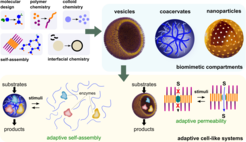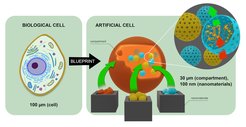Research
Research in the Silva Group is dedicated to the development and study of synthetic materials inspired by nature. We are particularly interested in creating programmable hirarchical systems with life-like properties for applications in chemical synthesis, molecular sensing and biomimicry.
We build our biomimetic systems from scratch (bottom-up approach), which gives us full control over their properties and performance. Our research combinines expertise in polymer chemistry, colloid chemistry, supramolecular chemistry and microfluidics.
Our areas of interest include:

Chemistry in compartments
Eukaryotic cells feature a compartments-in-compartment architecture that maximizes controllability and efficiency of internal cellular processes, many of them incompatible with each other. For example, the pH in lysosomes, organelles that contain digestive enzymes, is lower than the pH in the mitochondrial matrix. This difference can only be maintained thanks to compartmentalization. We are interested in designing multi-compartmentalized, multi-functional synthetic systems that resemble and behave like living cells but are entirely synthetic. To do that, we combine synthetic compartments such as polymer/lipid vesicles and coacervates, and a variety of catalytic components (e.g., nanoparticles, photocatalysts and enzymes) to emulate the architecture and function of living cells.

Membrane engineering
Amphiphilic block copolymers can self-assemble in aqueous media to form soft compartments, also known as polymer vesicles. The structure and chemical functionality of block copolymers can be easily modified, allowing unprecedented control over the physical and chemical properties of the vesicles they produce. We are particularly interested in developing polymer vesicles with mechanisms that allow 1) the selective transport of molecules across the membrane, 2) the growth and division of polymer vesicles.

Adaptive cell-like systems
One of the most powerful properties of cells is their ability to adapt to their environment so that they can interact with and respond to it. Systems that can adapt are not wasteful. They can optimize the use of their energy input and minimize unproductive or destructive behavior.
In the Silva group, we are developing cell-like systems that can adapt to changes in the chemical composition of the medium. Like cells, the systems are able to adjust their performance based on molecular cues. Technological applications of this research include efficient biosensors and micro-bioreactors.

If you are interested in our research and believe you can contribute to our work, please feel free to send your CV and cover letter to Dr. Lucas Caire da Silva (silva@...) at any time.



